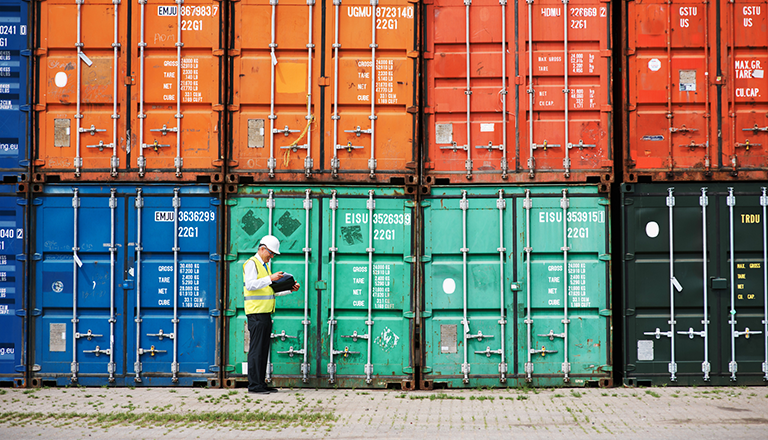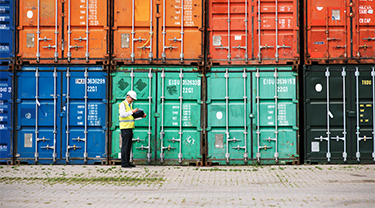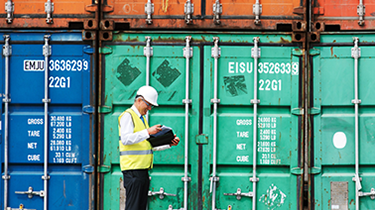
How to find a trustworthy freight forwarder
Author details
Emiliano Introcaso, CITP
Advisor & senior product operations manager
In this article:
- What’s a freight forwarder and what do they do?
- What’s a custom broker?
- Key differences between a freight forwarder and customs broker
- How can a freight forwarder help Canadian exporters?
- Where to find a trusted freight forwarder?
- Five things to look for in a freight forwarder
- EDC InList: Connecting exporters with freight forwarders
How to find a trustworthy freight forwarder
For many exporters, handling international shipping and logistics—from co-ordinating transportation to preparing customs paperwork—can be overwhelming. That’s where a reliable freight forwarder can help. They manage the details of getting your products to global markets efficiently and securely, so you can focus on growing your business.

A freight forwarder is a company or individual that connects exporters with transportation services, ensuring your goods get to other markets efficiently. Think of them as the ultimate logistics problem-solvers, handling everything from booking transportation to filing insurance claims.
They can either manage parts of your supply chain for you or take you every step of the way—often called “door-to-door” services. They include:
- warehousing or storage;
- getting the goods ready for international shipping (by sea, air, road or rail);
- preparing required documentation;
- purchasing cargo insurance;
- booking transportation and managing documentation (such as bills of lading);
- negotiating prices, routes and schedules to balance speed, cost and reliability;
- upon arrival, breaking down the shipment into smaller shipments for delivery to various destinations in the market; and
- filing claims on the cargo insurance if something goes wrong.
Their work streamlines the complex process of international shipping, saving you time and reducing logistical headaches. They often work with customs brokers, who have a complementary, but distinct role.
You should also check out
Learn how to use logistics and compliance best practices to enhance efficiency, reduce costs and boost satisfaction.

If freight forwarders are the logistics masterminds, customs brokers are the legal experts who ensure your goods cross borders without issue. Licensed and regulated by government authorities, customs brokers work on behalf of importers by:
- paying applicable duties and taxes;
- preparing necessary import documentation;
- offering guidance on tariffs, product value and country of origin;
- ensuring products comply with government regulations; and
- handling requests for rulings, refunds, appeals and special applications.
By working with an experienced customs broker, you reduce the risks of costly delays, compliance issues and penalties at the border.
Key differences between a freight forwarder and customs broker
|
Freight forwarder |
Customs broker |
Primary role |
Manages logistics and transportation of goods |
Ensures compliance with customs regulations |
Focus |
Shipping and delivery |
Legal and regulatory requirements |
Key services |
Booking transport, warehousing, insurance, etc. |
Documentation, tariff classification, paying duties |
When to use |
For planning and executing international shipments |
For clearing goods through customs at the destination |
Some freight-forwarding companies also provide customs brokerage services, giving exporters an end-to-end solution. This integrated approach can simplify the shipping process, especially for businesses that don’t have the internal resources to manage logistics and compliance separately.
Freight forwarders offer several other benefits besides getting your goods from Point A to B:
1. Simplifying international supply chains: Co-ordinating multiple forms of transportation, diverse stakeholders and schedules can be a challenge. Freight forwarders streamline these logistics by:
- Co-ordinating multiple carriers and managing last-minute disruptions, like port congestion, labour shortages or shipping delays
- Reducing risks of lost, damaged or stolen goods
- Providing tailored solutions for specialized shipments, including high-value or time-sensitive goods
2. Cutting costs through strategic partnerships: Freight forwarders use their industry connections and insights to control costs and increase efficiencies by:
- Negotiating discounts, streamlining routes and consolidating shipments
- Offering tailored insurance options to protect your goods, so you avoid unexpected losses
- Monitoring market trends such as rising fuel prices or container shortages to help you control costs
3. Adapting to market volatility: Political instability, shifting trade agreements and tariffs can disrupt supply chains, but freight forwarders can help you pivot quickly. They’re experienced in assessing political risks and strategizing ways to mitigate potential losses. They can also minimize disruptions by rerouting shipments, diversifying transportation options, or recommending alternative carriers.
Note: By keeping your logistics agile, they protect your bottom line, even in unpredictable circumstances.
4. Complying with international trade regulations: Staying compliant with international trade laws can be a challenge. Freight forwarders protect businesses from potential fines and delays by:
- Managing documentation and understanding the nuances of regulations; and
- Tackling everything, from preparing customs declarations and certificates of origin to monitoring changes in trade agreements, tariffs and compliance requirements.
Note: Handling these responsibilities by yourself could lead to errors. With a forwarder, compliance becomes much easier.
5. Using technology for exporting efficiency: Technology has transformed freight forwarding, giving exporters more visibility and control over their supply chains:
- Real-time tracking: Digital tools, like GPS, chatbots and instant messaging, make it easy for exporters to track shipment locations and statuses.
- Artificial intelligence (AI) and predictive analytics: Smart tools can improve route planning and predict shipping trends, or potential disruptions.
- Digital portals and tools: These provide self-service options for booking, rate checking and documentation.
- Smart containers: Equipped with sensors, they monitor temperature and humidity conditions for sensitive goods, like food or pharmaceuticals.

6. Strengthening global business relationships: Freight forwarders support relationships with customers and overseas partners by ensuring reliability with every transaction. They can also bridge cultural differences and language barriers when communicating with customs officials, carriers, or buyers in other countries. With their help, you can build trust, boost credibility and create lasting partnerships to drive your business forward.
7. Providing sustainable export solutions: Corporate sustainability initiatives are a priority for many businesses. Freight forwarders equipped with eco-friendly strategies can help ensure goods are delivered sustainably without compromising efficiency by:
- Consolidating shipments to reduce container usage, leading to cost savings and saving on fuel
- Choosing more energy-efficient transportation modes, leveraging alternative fuels and technology to help reduce emissions
- Helping ensure compliance, avoiding fines, or delays for countries with stricter environmental regulations
Note: These solutions can help set your business apart by demonstrating responsible business practices and attracting sustainability-focused customers and partners.
The Canadian International Freight Forwarders Association (CIFFA) offers a directory of freight forwarders who meet stringent industry standards. CIFFA-certified professionals are trained and experienced in international shipping logistics.
Export Development Canada’s (EDC) InList is a free service that connects you with freight forwarders that meet our requirements for quality and reliability. You can read more about EDC InList below.
Your business can benefit greatly from having a freight forwarder—as long as you choose the right one.
“Especially if you’re a smaller company, or are new to exporting, the required process, paperwork and regulations to ship your goods can be daunting,” says Arnon Melo, president of CIFFA and owner of MELLOHAWK Logistics, a Canadian company specializing in worldwide transportation and logistics services.
“But by partnering with the right freight forwarder, you can let them take care of the logistics, while you focus on what you do best: Making a great product and growing your business,” Melo says.
His five best practices for choosing the best freight forwarder:
1. Choose a freight forwarder with knowledge and expertise that match your needs: A freight forwarder can’t be all things to all companies. Trade requirements and regulations vary from country to country and every business is unique. That means, you should try to find a freight forwarder that specializes in your sector or the markets you’ve chosen.
By partnering with the right freight forwarder, you can let them take care of the logistics, while you focus on what you do best: making a great product and growing your business.
Melo suggests asking these questions when trying to find a good match:
- Look at the kind of services the freight forwarder provides—are you OK choosing à-la-carte services, or do you need a full-service company tracking the shipment?
- How big is their network?
- Do they specialize in facilitating the shipping of certain types of products or commodities?
- Do they have experience and expertise with specific modes of transportation, shipping routes, or markets?
- What do they understand about your particular industry?
An added bonus: If the freight forwarder has multiple clients dealing in the same market or sector, they may be able to offer lower rates due to the prices they can negotiate.
Another area of expertise that companies may not think about, Melo adds, is dealing with various types of payment options.
“You’ll want to know if they have experience with letters of credit, for example, and other types of more sophisticated payment transactions,” he says. “That’s important because using letters of credit can get quite complicated in certain markets and it could slow down the process if the freight forwarder isn’t cognizant of the procedures around it.”
2. Make sure your potential freight forwarder has a healthy sense of curiosity: The freight-forwarding industry is focused on relationships, as well as shipping and logistics know-how. That means you should choose a freight forwarder who’s intensely curious—about trade, people and your business. Those who are naturally curious about others tend to be well-connected.
“Your freight forwarder should be able to build rapport with others and show a keen interest in how their business works and what their needs are,” Melo says. “If your prospective freight forwarder loves to talk and asks plenty of questions, that’s a good sign.”
3. Choose a freight forwarder who’s well-connected: From warehousing to cargo carriers and customs, there are many different contacts in exporting goods to another market. But if you have a freight forwarder whose relationships with those connections are already well-established, you get the benefits of an expert organizer and negotiator with all of these connections—through just one point of contact.
4. Your freight forwarder should be transparent about services and price: Freight forwarders must balance a structure between price, timing and risk, Melo insists.
“Be careful if rates look too good to be true and be aware that the lowest rate is not always the best match for your needs,” he explains. “That lower rate may be due, for example, to a longer route they plan to take, so make sure that the extra time for delivery meets your requirements.”
Note: To ensure you’re getting the right deal for your needs, Melo recommends choosing a freight forwarder who’s transparent about how they’ll handle your shipment, the routes they’ll use and how they’ve structured their pricing.
5. Consider a freight forwarder who’s CIFFA-certified: CIFFA is a Canadian-based, globally recognized association for freight forwarders.
“To become a member, a freight forwarder must meet certain minimum requirements,” Melo says. “This sets a bar for your freight forwarder right away.”
For example, CIFFA members must be bonded, have errors and omissions insurance, invest in trained staff and in business for at least three years. The CIFFA website also describes the association’s exclusive standard trading conditions (STCs), which only CIFFA members can reference. The STCs clearly outline the roles and responsibilities of a company and the freight forwarder, letting you know what to expect and governing the relationship between you.
EDC InList is a free, easy-to-use tool that helps you search for CIFFA-certified freight forwarders by country, industry or specific logistics needs.
Benefits for exporters
“If you want to find a forwarder with expertise in a certain market, you can easily filter for certified providers already vetted by EDC,” says Cheng-Hsi Chiang, Innovation advisor at EDC. “You can also filter by transportation type and service category, like cargo insurance, warehousing, special handling, or 24-hour service.”
“Having a dependable logistics partner is more important than ever in today’s global market,” adds Chiang. “For new exporters, or those looking to expand into new markets, finding the right freight forwarder gives them the confidence to enter into new markets.”
To get started, register for a MyEDC account. This gives you one-click access to InList, along with a variety of valuable trade tools, including the Export Help Hub, webinars, expert analysis and more.
Benefits for freight forwarders
Stand out from the competition by highlighting your regional, industry, and service expertise on InList.
“It’s a quick and easy process to apply and be published on our site,” says Chiang. “Once you’re listed, it gives you access to a network of Canadian businesses that are ready to export and helps boost your brand as a trusted logistics partner.”
If you’re a freight forwarder and want to connect with exporters, apply today through a MyEDC account.
This content was partially created using generative artificial intelligence (GenAI).
















